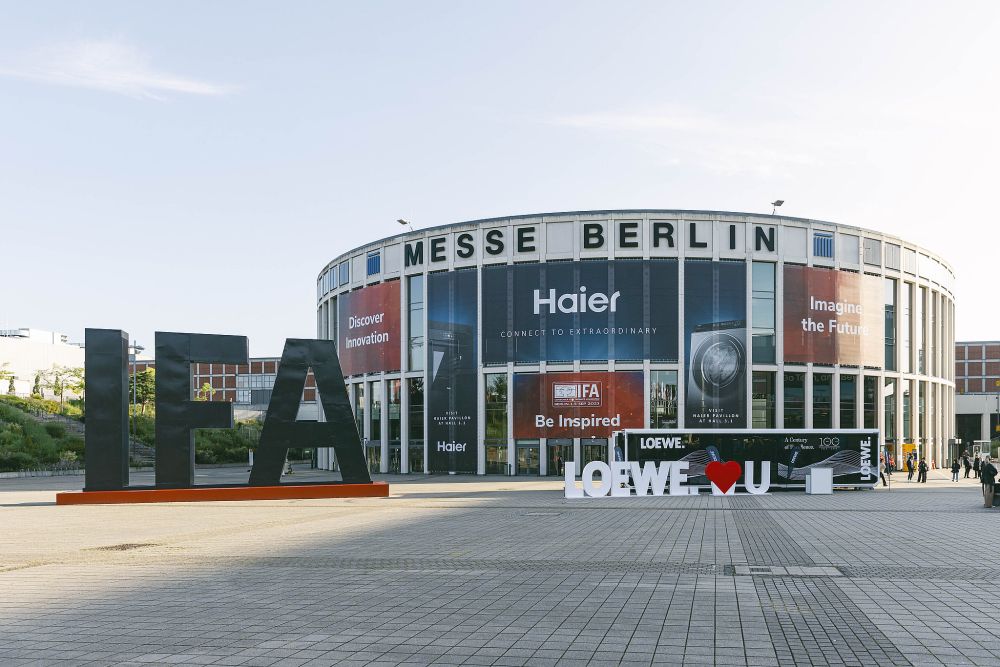IFA Berlin 2023: Sustainability Dominates Discussions and Innovations
Sustainability is one of the big themes at this year’s IFA, both across all exhibition halls and during Saturday’s panel discussions at the IFA Leaders Summit Berlin, 2 September 2023 – Whether it’s devices that make efficient use of energy and water and reduce microplastics, manufacturing using sustainable raw materials, or solutions that help consumers to produce their own renewable energy – sustainability is this year’s big topic across booths in all exhibition halls.
IFA’s first Sustainability Village in Hall 2.2 is bringing together many sustainability solutions, with the House of Sustainability showing consumers that it is possible to be carbon neutral with technologies that are available today already. Visitors can book test drives with Tesla’s latest electric car and try out comfortable electric scooters and two-wheelers. Throughout the day, expert panels discuss sustainability issues like the integration of sustainable technology into future homes, and how to reduce, reuse and recycle consumer electronics.
Sustainability was also a big topic on the second and final day of the IFA Leaders Summit, with panels discussing issues such as energy efficiency and the circular economy. Christine Betz, Chief Sustainability Office at BSH Home Appliances, discussed how consumers can be incentivised to contribute to the circular economy: “We need to close the loop, because material is scarce and we should stop treating old appliances as waste.”
Christine Wörlen of Arepo Consult said that clear communication was key. Most consumers were struggling to understand the true return on investment – where an energy-efficient appliance may cost more to buy, but would save even more money over just a few years. Using devices in a sustainable way had to be intuitive, because few people were studying manuals to understand all functionalities.
Highlighting the speed of innovation in the sustainability sector, the CEO of Signify GmbH Rada Rodriguez warned against overregulation, as that might “kill innovation”.
Martin Schulte, sustainability and supply chain expert at Oliver Wyman, outlined the complexity of circular value chains and how they could be made commercially viable – not least considering the cost of taking a broken product back, unscrewing and repairing, or if all fails recycling it.
Eco Engineer Franz Streibl called on designers to build repairability into the design of devices. By making appliances modular, it would be possible for consumers to repair devices by themselves, and update key components to make use of the latest technological advances.
Christoph Wendker, Vice President of Sustainability at Miele, also called for a modular design approach that makes appliances more repairable, but flagged the increased cost of making parts interchangeable. The circular economy would work only if its business model was acceptable to customers.
Elin Bergman, co-founder of Nordic Circular Hotspot, said the economics of consumer electronics and appliances had to be changed so that repair was “easier and cheaper than buying new.”
The IFA Leader Summit also tackled issues such as the interoperability and security of the Internet of Things and how robots and automation will revolutionise the way we live and work.
Influencer and investor Diana zur Löwen gave a keynote on how brands can best engage with Gen Z audiences – whether that’s through the efficient use of social platforms like TikTok or collaborations with influencers and creators.
From Sunday onwards, IFA’s main stage will focus on another crucial topic for the tech industry: diversity, equality, inclusion, and especially the role of women in tech. In speeches and panels, experts will discuss the role of diversity for artificial general intelligence, bias in the digital age, and how women leaders can be propelled to new heights.
